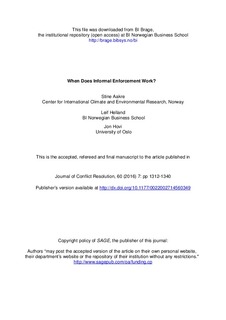When does informal enforcement work?
Journal article, Peer reviewed
Permanent lenke
http://hdl.handle.net/11250/2415306Utgivelsesdato
2016Metadata
Vis full innførselSamlinger
- Scientific articles [2181]
Sammendrag
We study experimentally how enforcement influences public goods provision when subjects face two free-rider options that roughly parallel the nonparticipation and noncompliance options available for countries in relation to multilateral environmental agreements (MEAs). Our results add to the MEA literature in two ways. First, they suggest that compliance enforcement will fail to enhance compliance in the absence of participation enforcement. Second, they indicate that compliance enforcement will boost compliance significantly in the presence of participation enforcement. Our results also add to the experimental literature on public goods provision, again in two ways. First, they reveal that previous experimental findings of enforcement boosting cooperation are valid only in settings with forced (or enforced) participation. Second, they show that subjects’ willingness to allocate costly punishment points is significantly stronger when the enforcement system permits punishment of both types of free riding than when it permits punishment of only one type.
Beskrivelse
This is the accepted, refereed and final manuscript to the article
